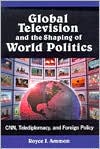List Books » Global Television and the Shaping of World Politics: CNN,Telediplomacy,and Foreign Policy
Category Books
- Fiction Books & Literature
- Graphic Novels
- Horror
- Mystery & Crime
- Poetry
- Romance Books
- Science Fiction & Fantasy
- Thrillers
- Westerns
- Ages 0-2
- Ages 3-5
- Ages 6-8
- Ages 9-12
- Teens
- Children's Books
- African Americans
- Antiques & Collectibles
- Art, Architecture & Photography
- Bibles & Bible Studies
- Biography
- Business Books
- Christianity
- Computer Books & Technology Books
- Cookbooks, Food & Wine
- Crafts & Hobbies Books
- Education & Teaching
- Engineering
- Entertainment
- Foreign Languages
- Game Books
- Gay & Lesbian
- Health Books, Diet & Fitness Books
- History
- Home & Garden
- Humor Books
- Judaism & Judaica
- Law
- Medical Books
- New Age & Spirituality
- Nonfiction
- Parenting & Family
- Pets
- Philosophy
- Political Books & Current Events Books
- Psychology & Psychotherapy
- Reference
- Religion Books
- Science & Nature
- Self Improvement
- Sex & Relationships
- Social Sciences
- Sports & Adventure
- Study Guides & Test Prep
- Travel
- True Crime
- Weddings
- Women's Studies
Global Television and the Shaping of World Politics: CNN,Telediplomacy,and Foreign Policy » (New Edition)

Authors: Royce J. Ammon
ISBN-13: 9780786410620, ISBN-10: 0786410620
Format: Paperback
Publisher: McFarland & Company, Incorporated Publishers
Date Published: August 2001
Edition: New Edition
Author Biography: Royce J. Ammon
Book Synopsis
In 1995, United Nations Secretary-General Boutros Boutros-Ghali said of the Cable News Network, "CNN is the sixteenth member of the [15 member United Nations] Security Council." Scholars as well as diplomats have recognized the existence of a link between communications and diplomacy, but up until now the implications of this relationship have been left unexplored. In this work, the author studies the historic interconnectedness between communications and diplomacy, how communications have historically determined the practice of diplomacy, and how, with the development of global television, communications can determine diplomatic outcomes under certain conditions. This work also examines the ways in which today's broadcasting will shape foreign policy processes in the future and the future impact of global television in world politics.
Author Biography: Royce J. Ammon (B.A., M.A., and Ph.D., University of Nebraska—Lincoln) is currently working on his next book about world politics. Dr. Ammon also teaches at the University of St. Thomas in St. Paul, Minnesota.
Library Journal
Television coverage of the recent terrorist attacks in the United States and the resulting military actions make this book on the role of global television in shaping world politics very timely. In this revision of his dissertation, Ammon (Univ. of St. Thomas) traces the relationship between diplomacy and communications technology, arguing that changes in communications have historically determined diplomatic practices and their outcomes. Ammon analyzes the CNN coverage of the Persian Gulf War in 1991 to offer one example of the way television influences foreign policy, arguing that Western powers offered humanitarian aid to Iraqi Kurds at the end of the war because their plight was televised. The rebellious Shi'ite Muslims, on the other hand, were forced to flee into the marshlands of southern Iraq, receiving no television coverage and consequently no Western aid. Ammon balances his account by detailing conditions that can weaken the impact of television, which he uses to explain the lack of response to the genocide in Rwanda. This important study will be of special interest to media and international relations scholars. Judy Solberg, George Washington Univ. Lib., Washington, DC Copyright 2001 Cahners Business Information.
Table of Contents
| Acknowledgments | ||
| Preface | 1 | |
| 1 | Communication and Diplomacy: An Historic Relationship | |
| 1 | The Communication-Diplomacy Link | 5 |
| 2 | Paradigms, Communication, and Diplomacy | 12 |
| 3 | Diplomacy and Communication: The Results of Linkage | 48 |
| 2 | Communications and Diplomacy: Present Realities | |
| 4 | The Persian Gulf War and Telediplomacy: The Next Diplomatic Paradigm | 65 |
| 5 | Global Television's Ability to Drive Policy | 88 |
| 6 | Global Television and Diplomatic Outcomes | 96 |
| 7 | Global Television's Mechanisms for Driving Policy | 130 |
| 3 | Communications and Diplomacy: Future Potential | |
| 8 | Today's Communications, Tomorrow's Diplomacy | 151 |
| Notes | 155 | |
| Bibliography | 156 | |
| Index | 189 |
Subjects
 Media
Media  Journalism
JournalismEntertainment
 Television
Television  Television Broadcasting - Political Aspects
Television Broadcasting - Political AspectsEntertainment
 Television
Television  Television News Programs
Television News ProgramsNonfiction
 Social Sciences
Social Sciences  Media & Communications
Media & CommunicationsNonfiction
 All Nonfiction
All Nonfiction  Diplomacy & International Relations
Diplomacy & International RelationsPolitical Books & Current Events Books
 International Relations
International Relations  Diplomatic Relations
Diplomatic RelationsPolitical Books & Current Events Books
 International Relations
International Relations  International Relations - General & Miscellaneous
International Relations - General & MiscellaneousPolitical Books & Current Events Books
 All Politics
All Politics  Diplomacy & International Relations
Diplomacy & International RelationsScience & Nature
 Social Sciences
Social Sciences  Media & Communications
Media & CommunicationsSocial Sciences
 Media & Communications
Media & Communications  Journalism
JournalismNonfiction
 Entertainment
Entertainment  Media
MediaNonfiction
 Entertainment
Entertainment  Television
TelevisionNonfiction
 Politics & Current Affairs
Politics & Current Affairs  International Relations
International Relations
